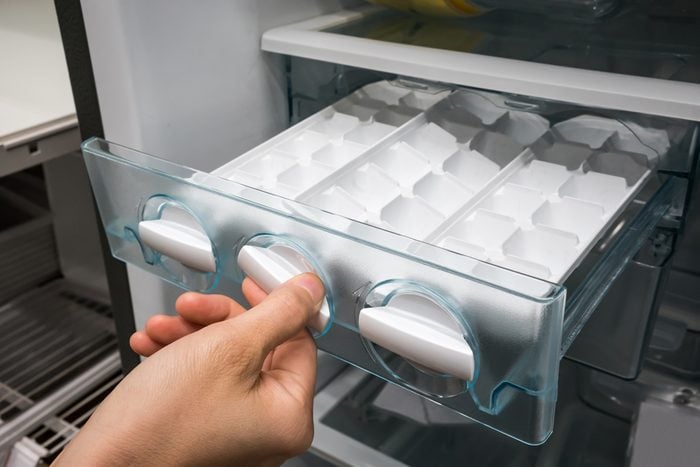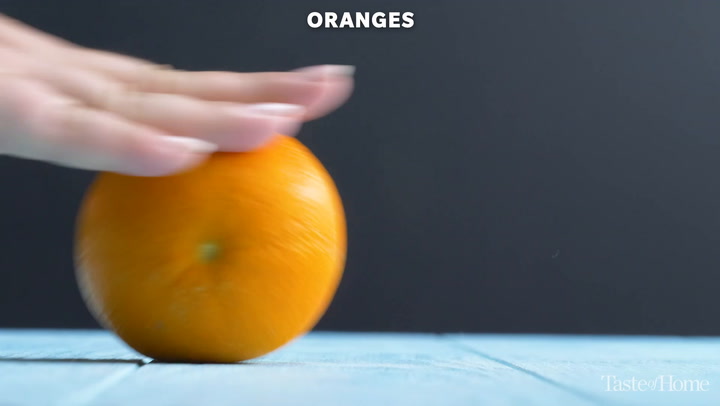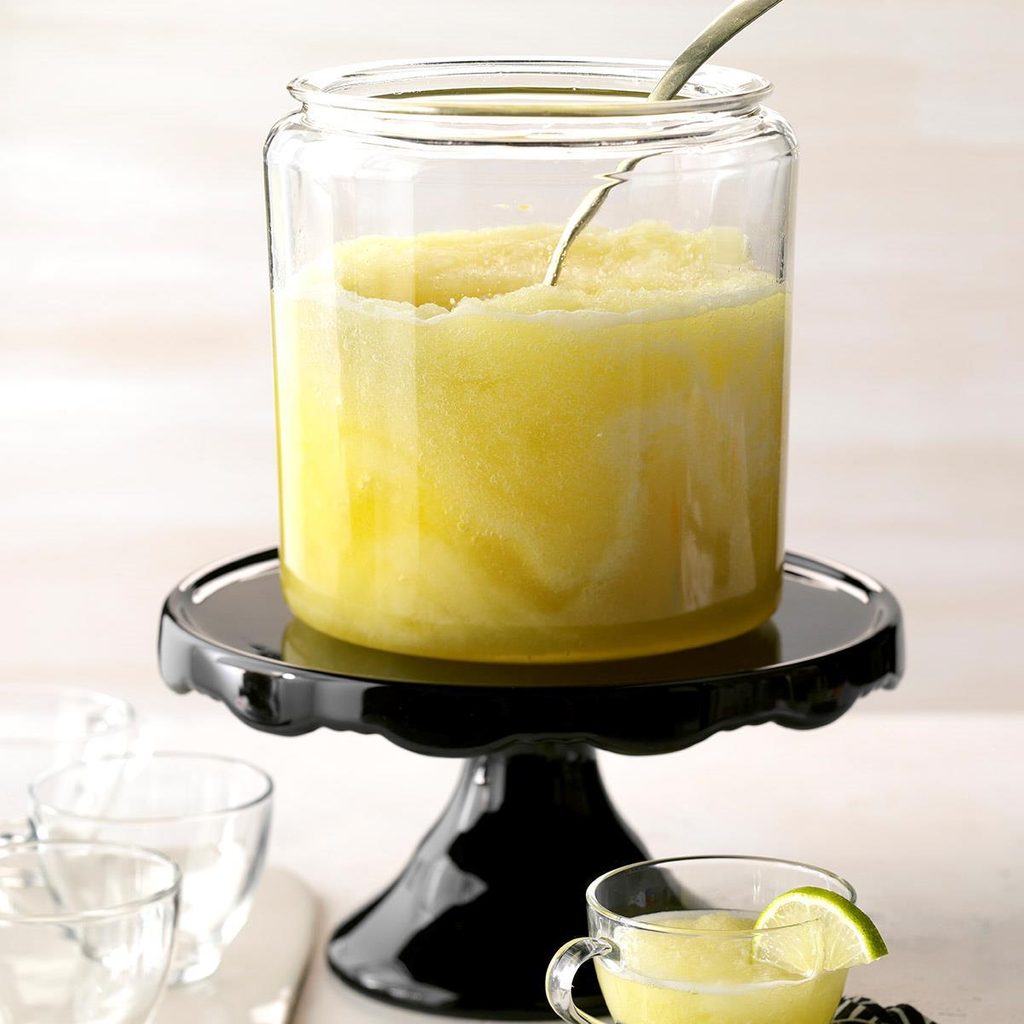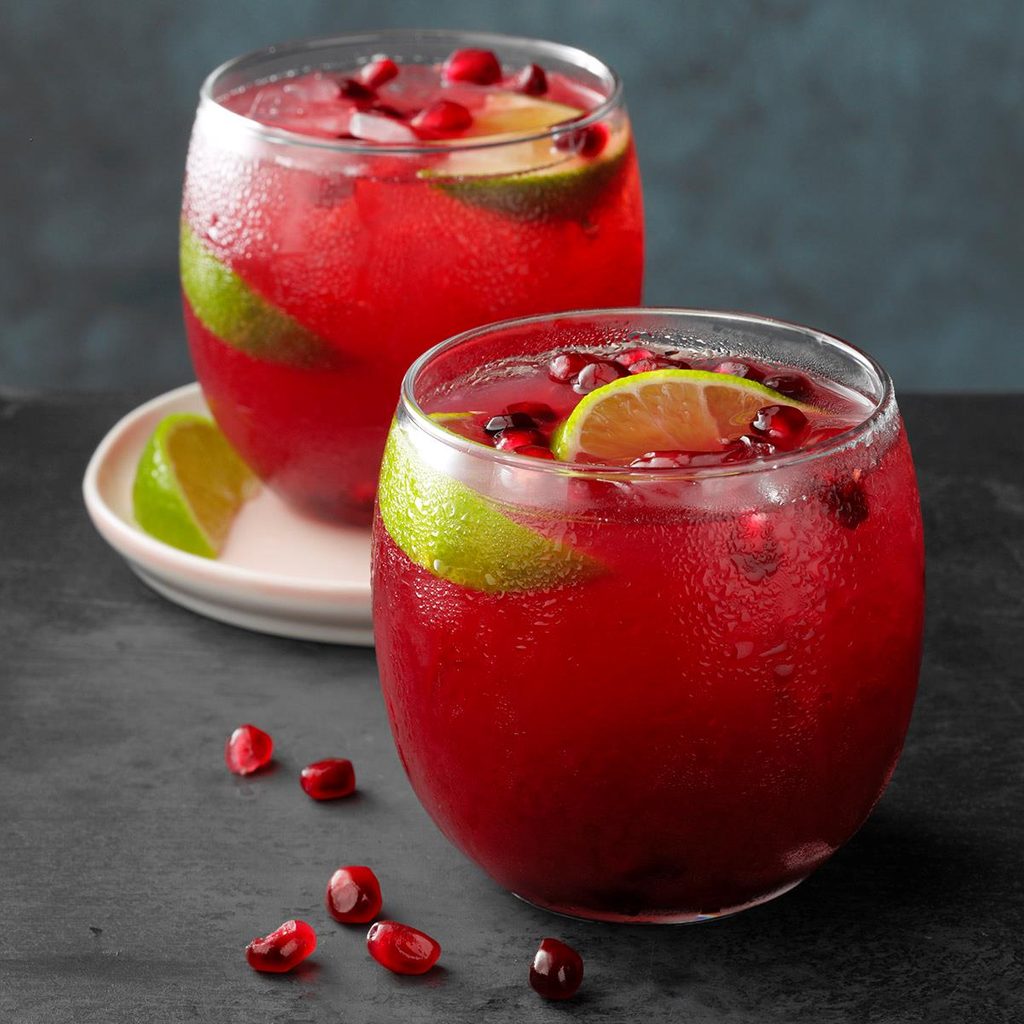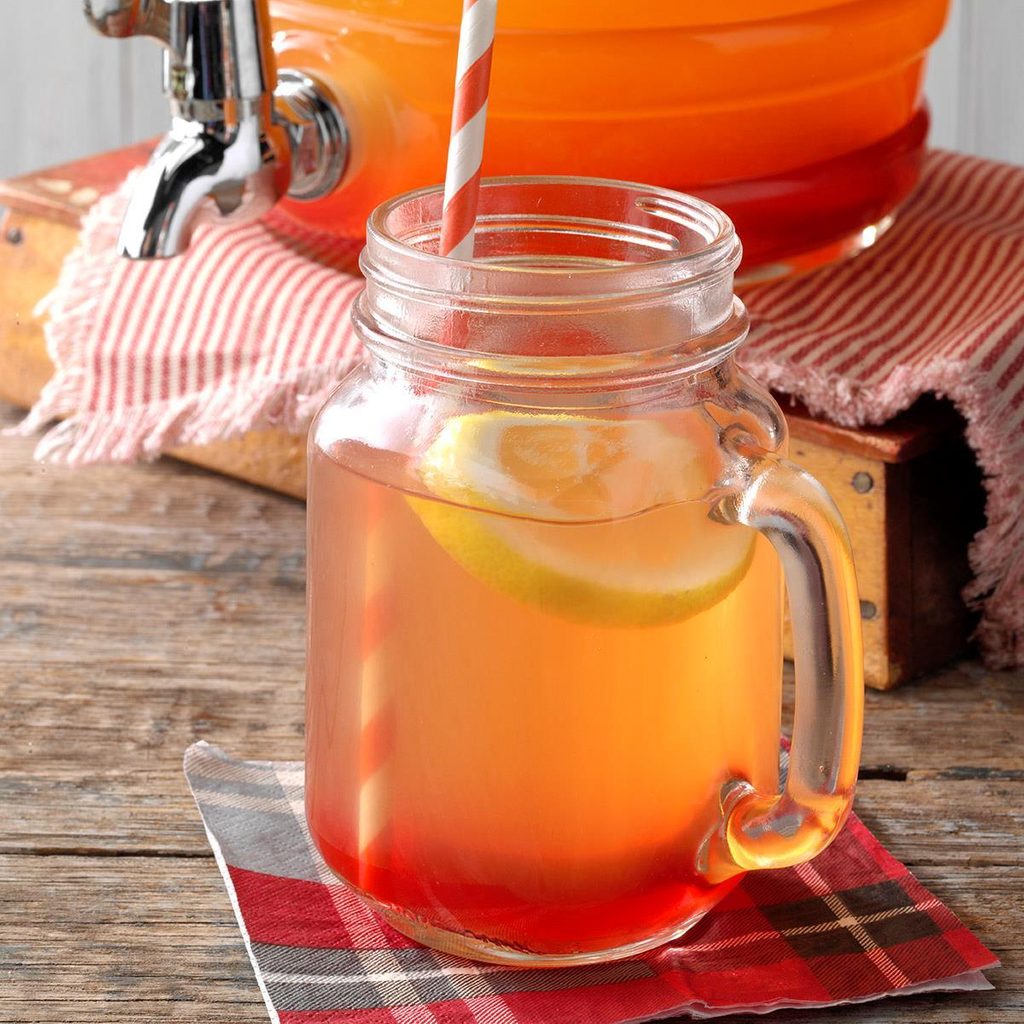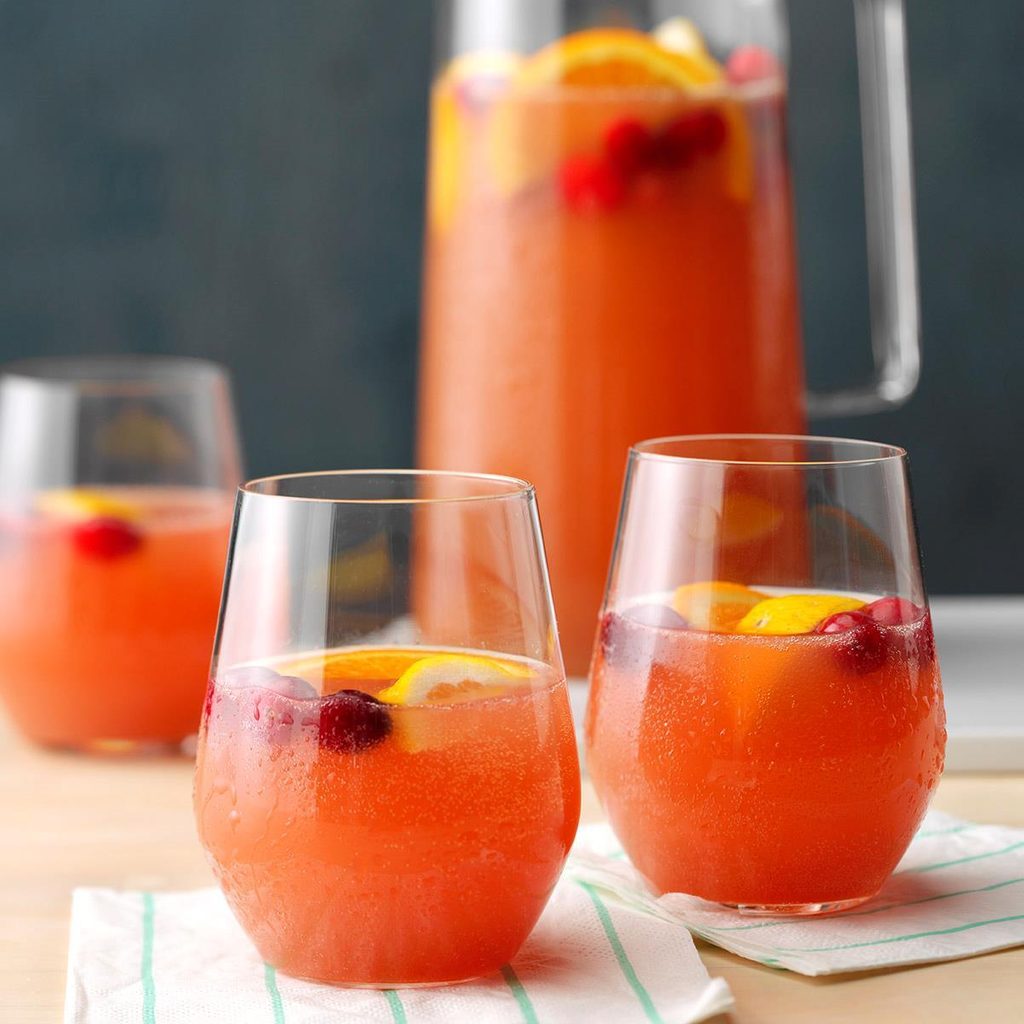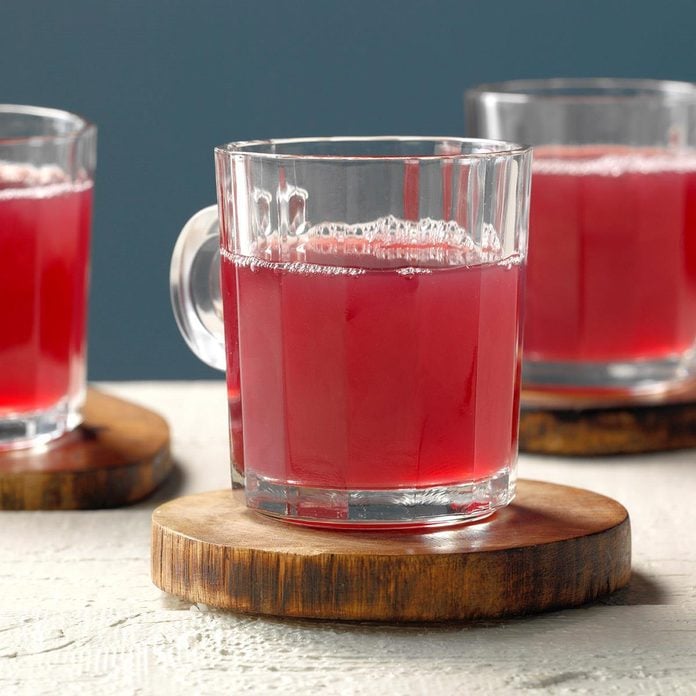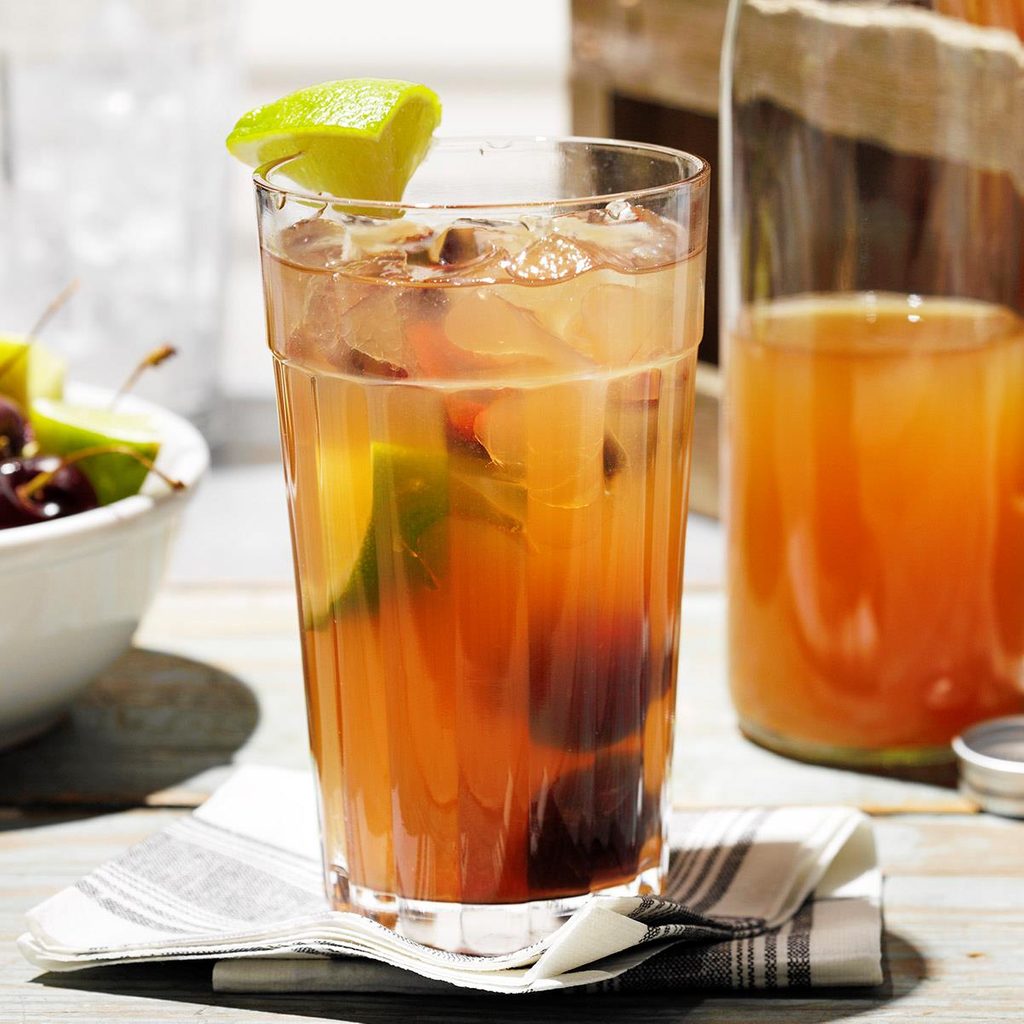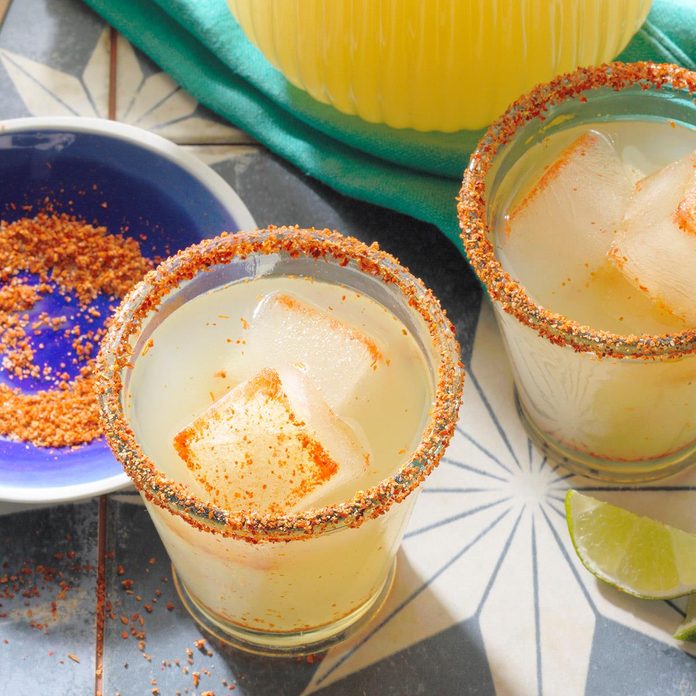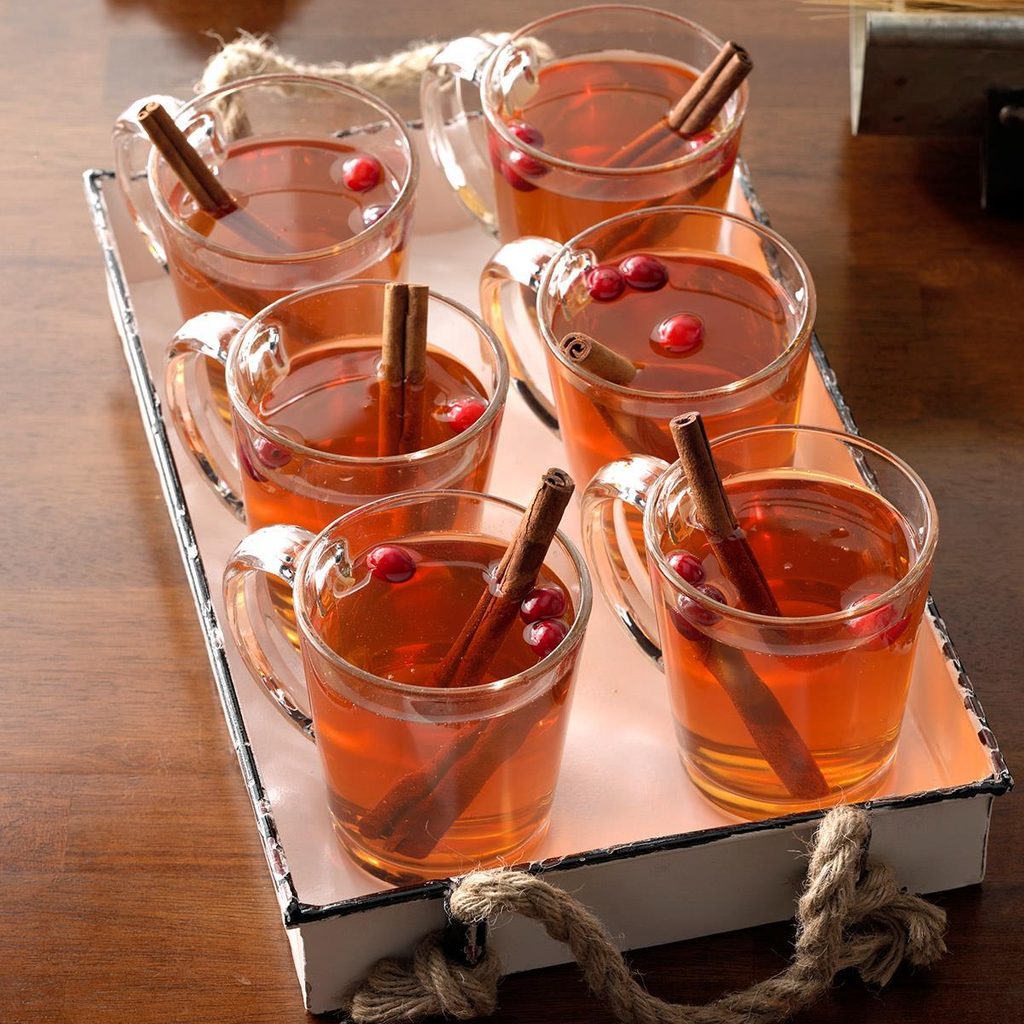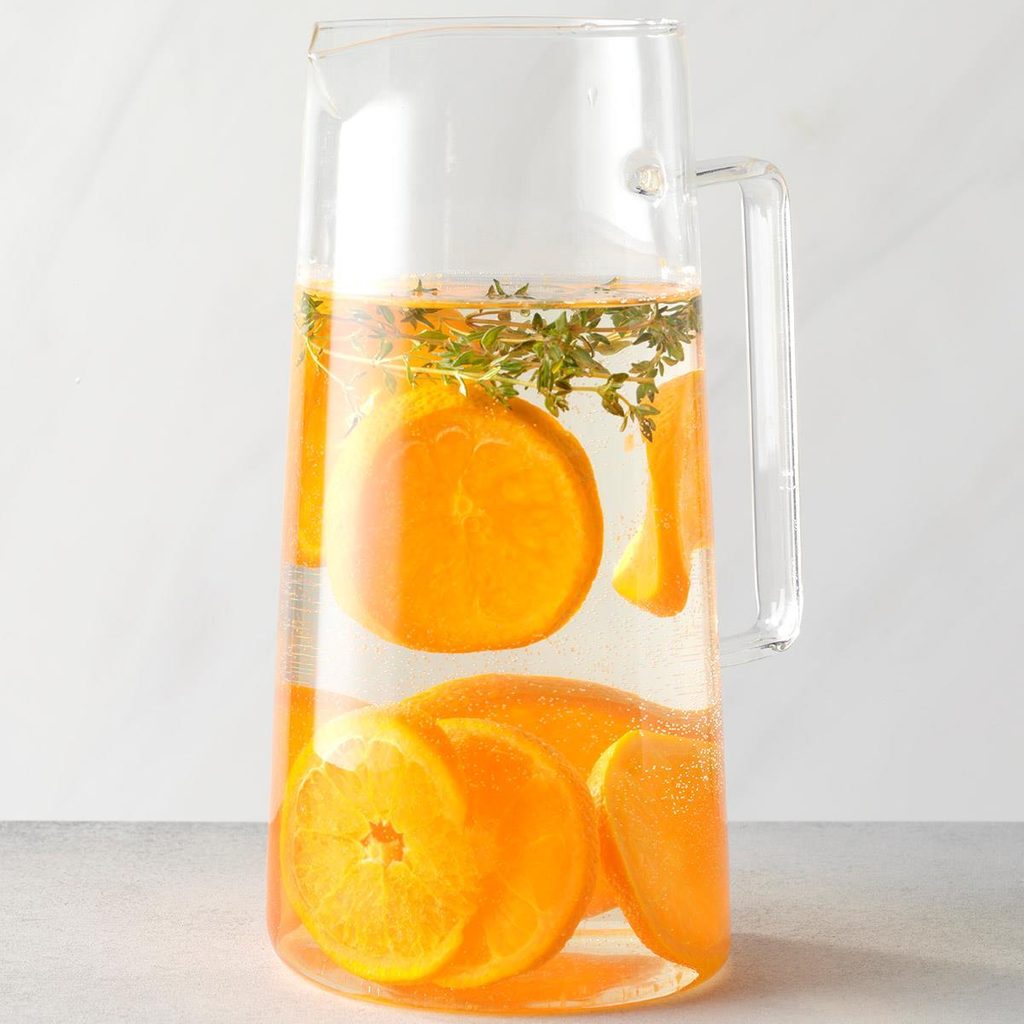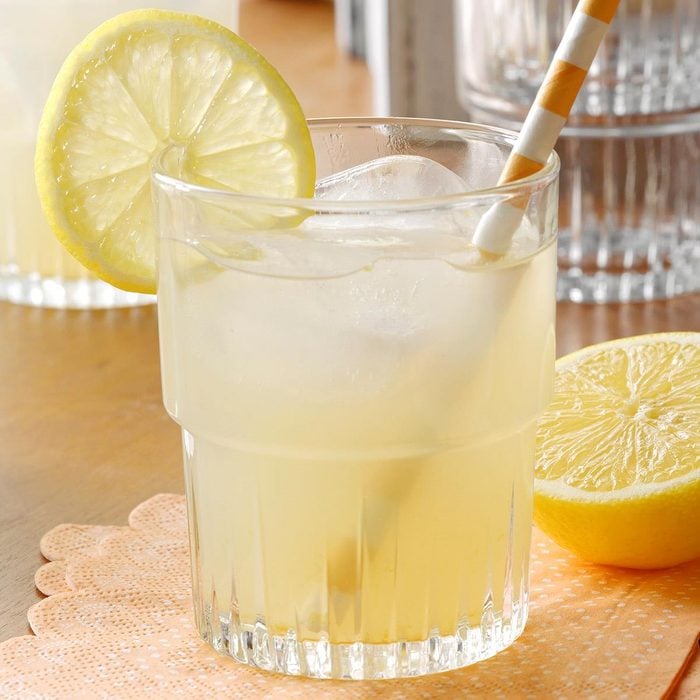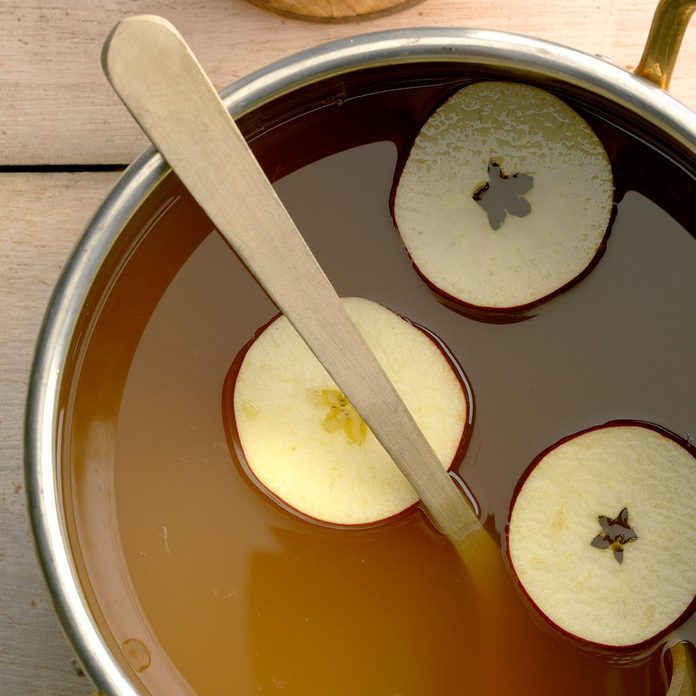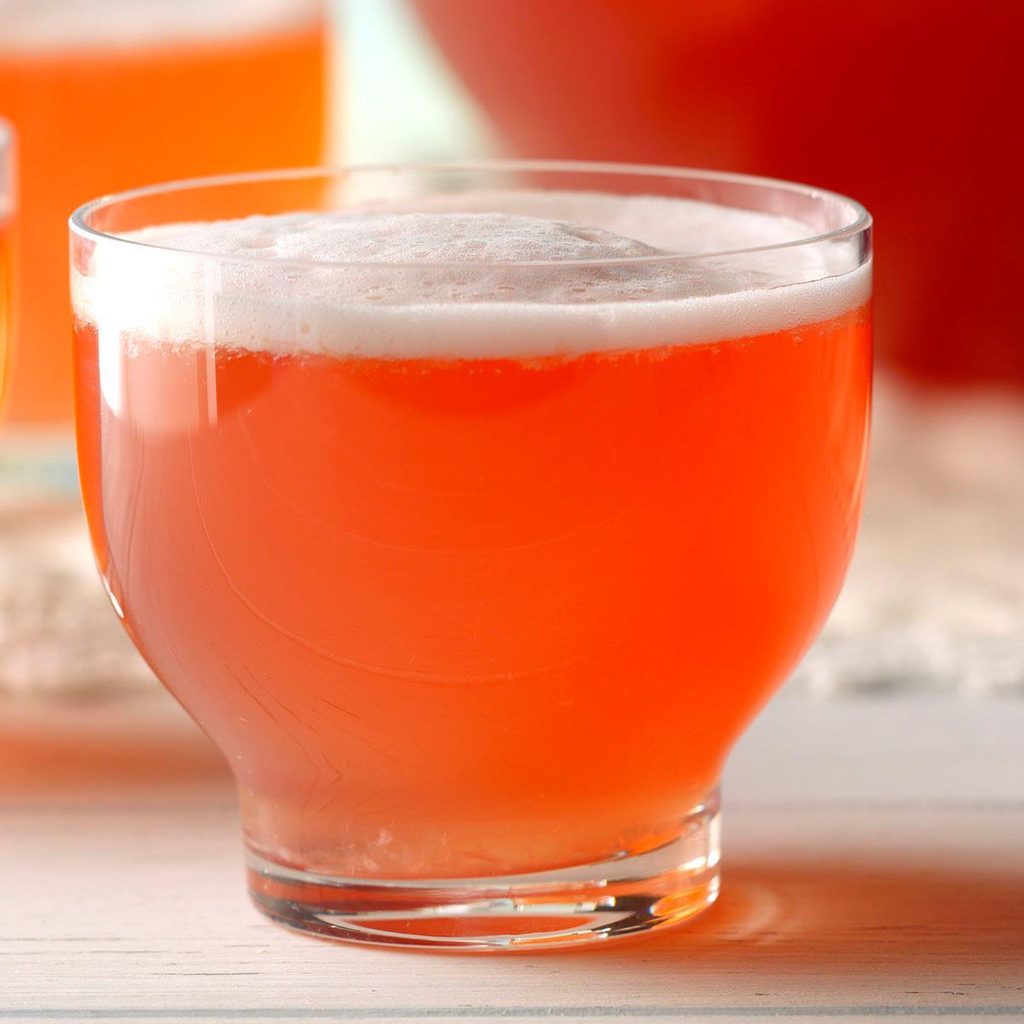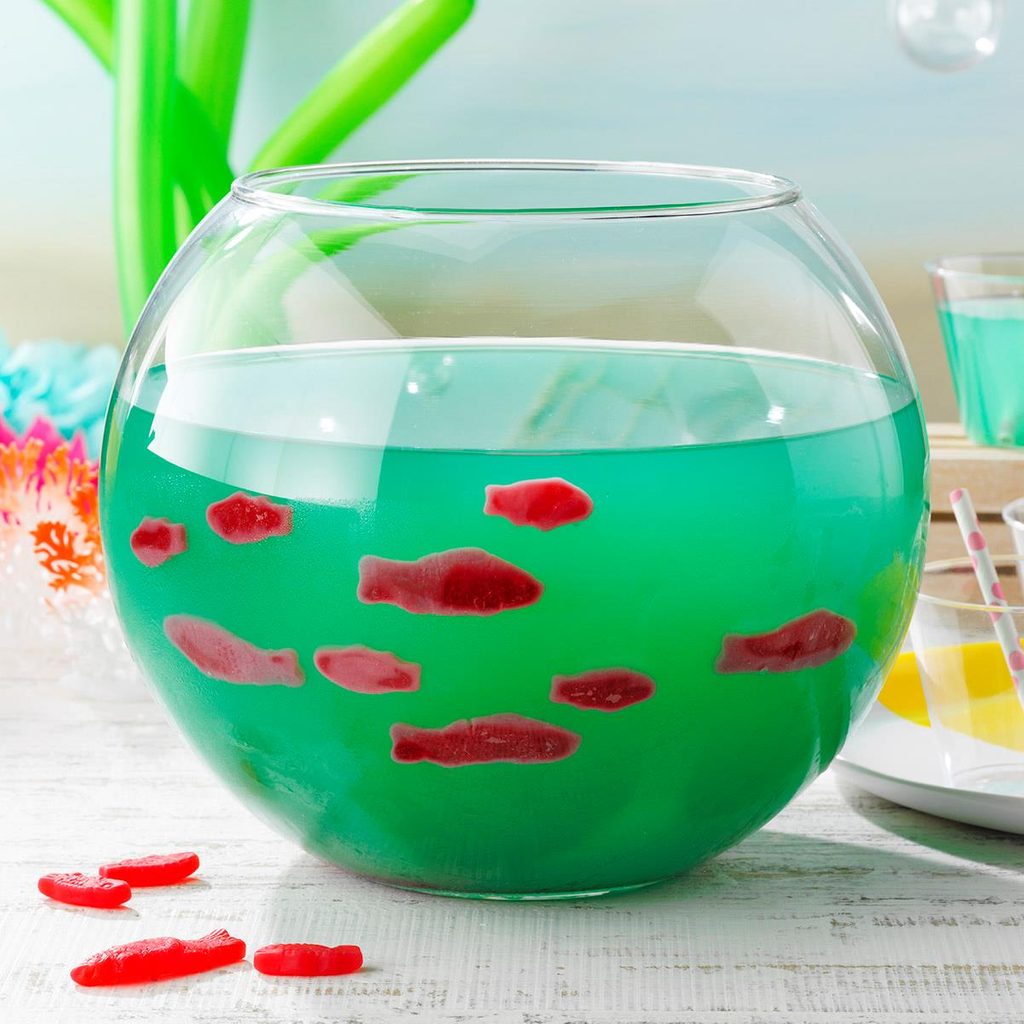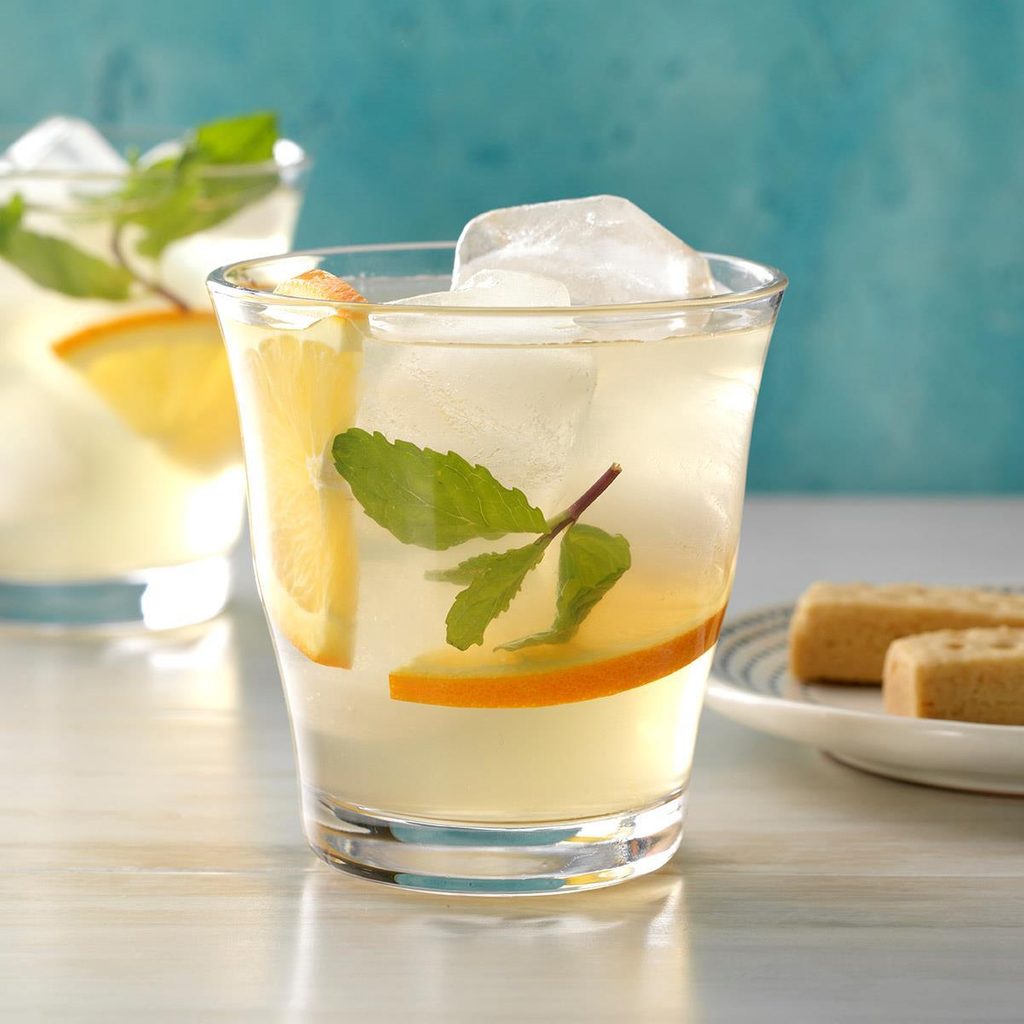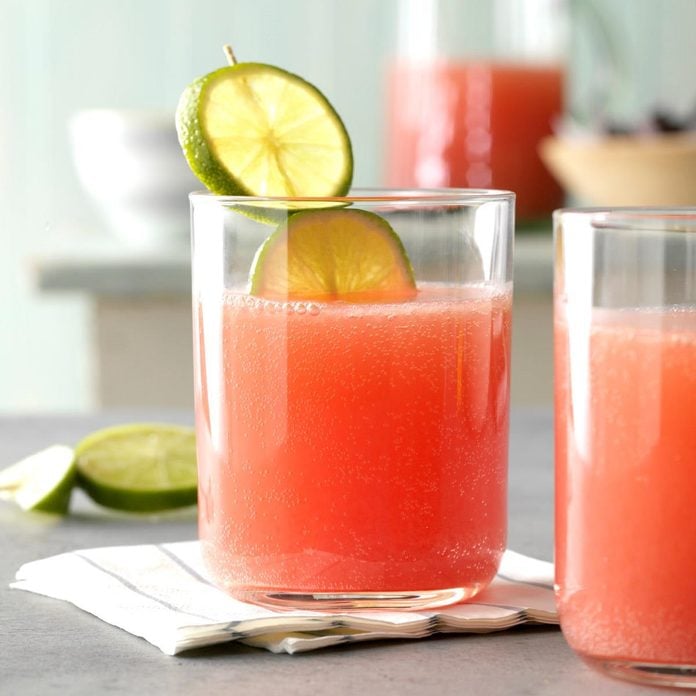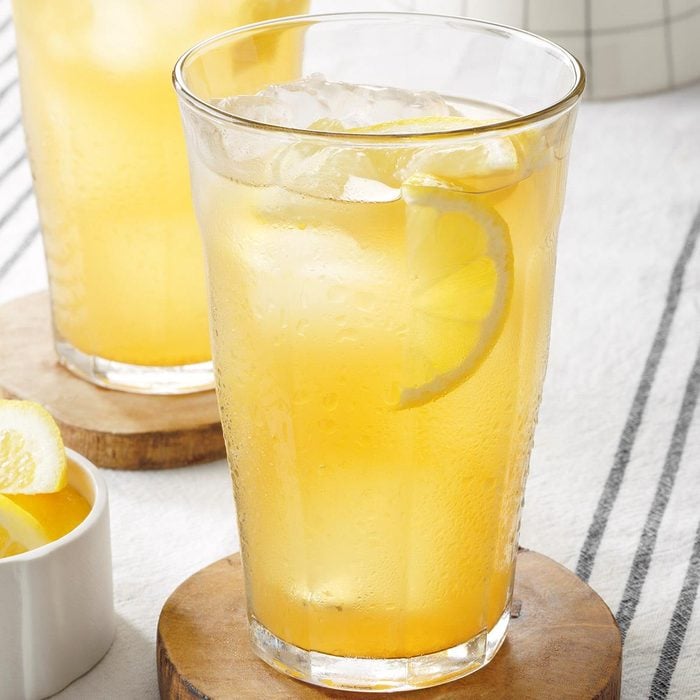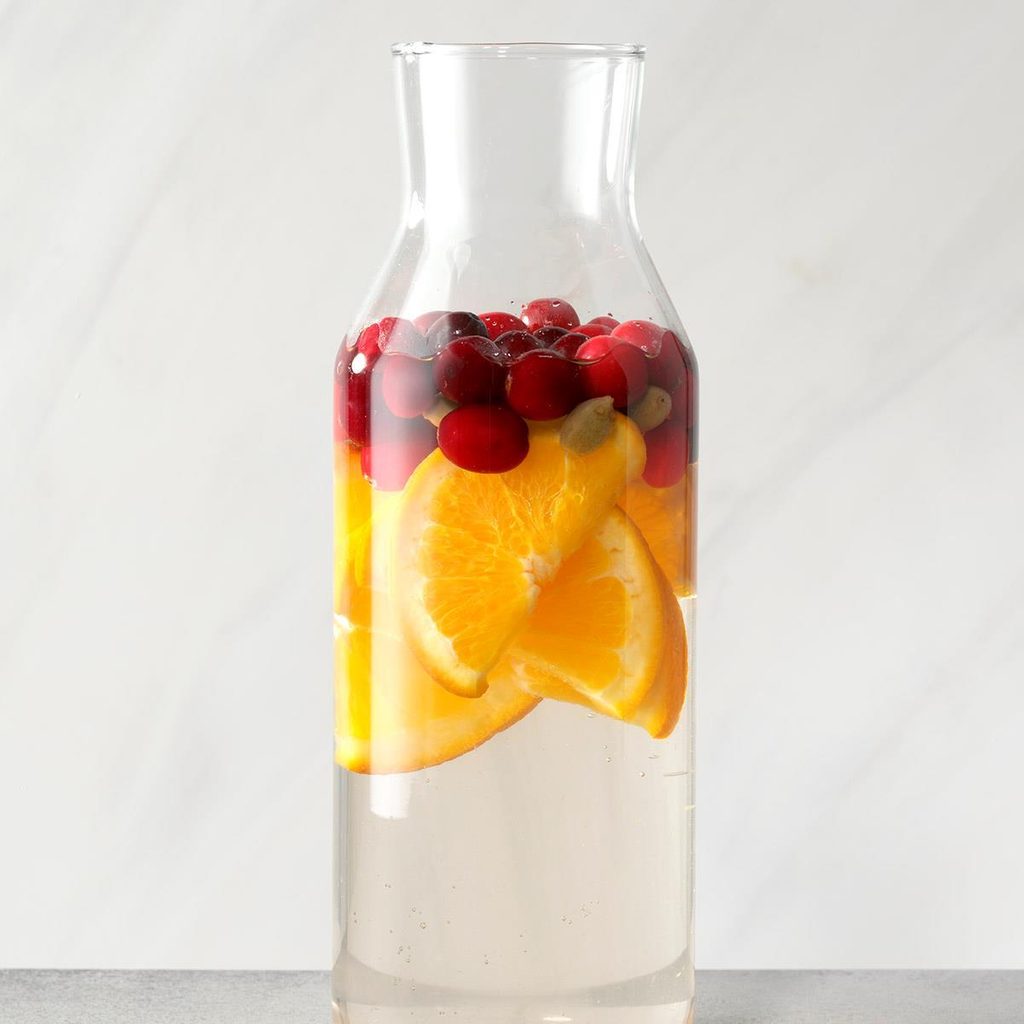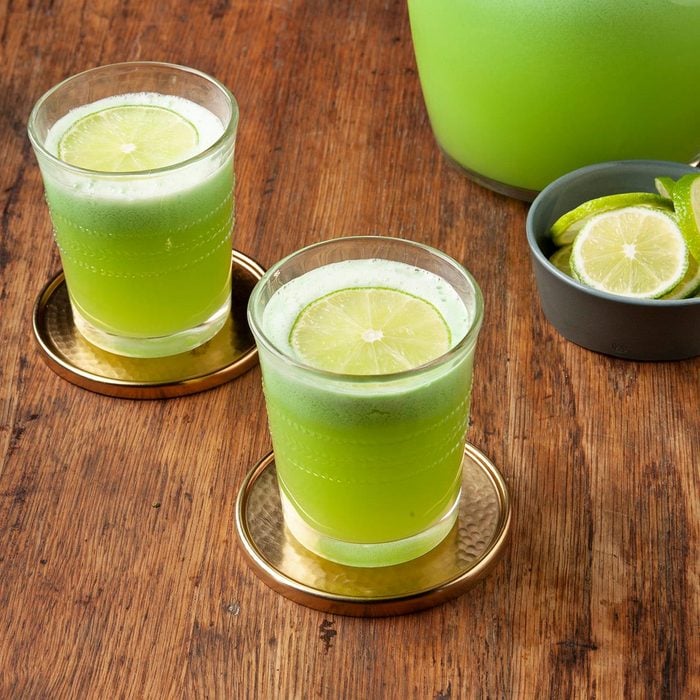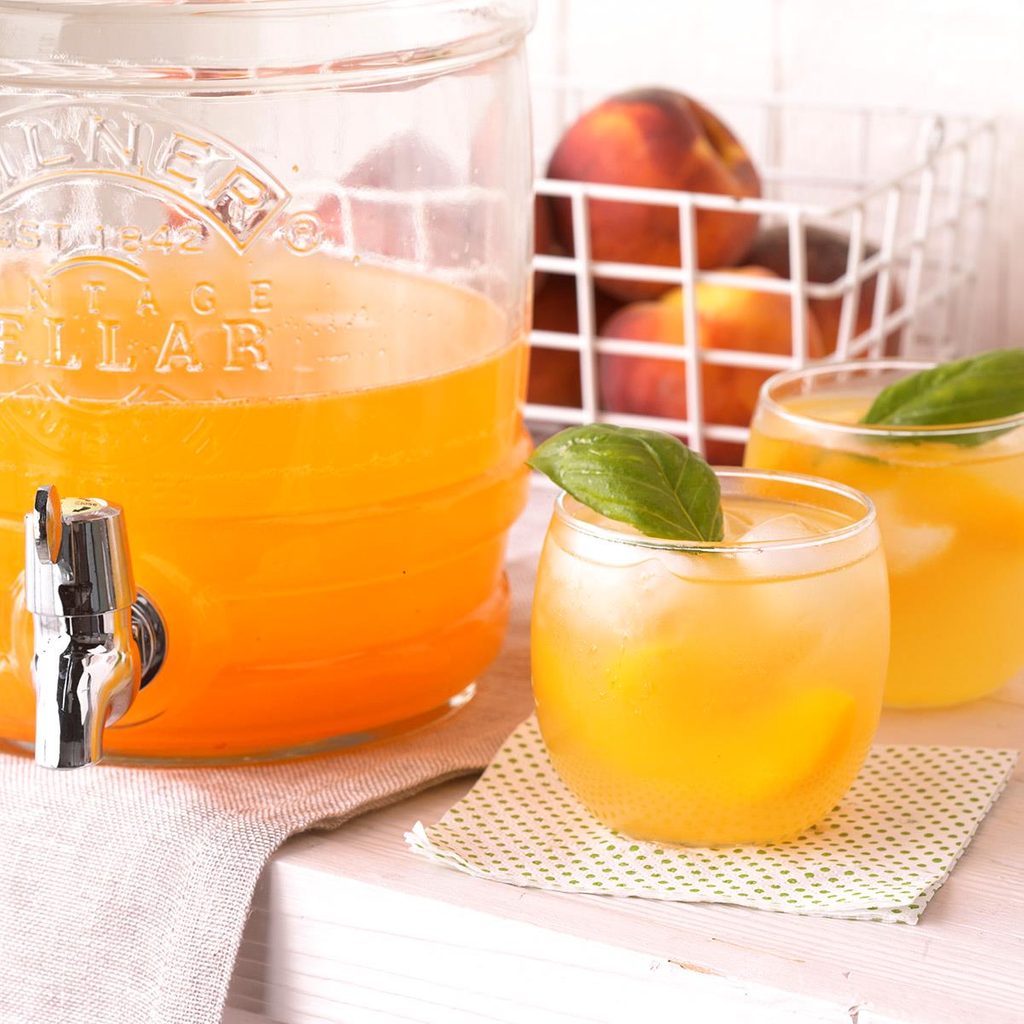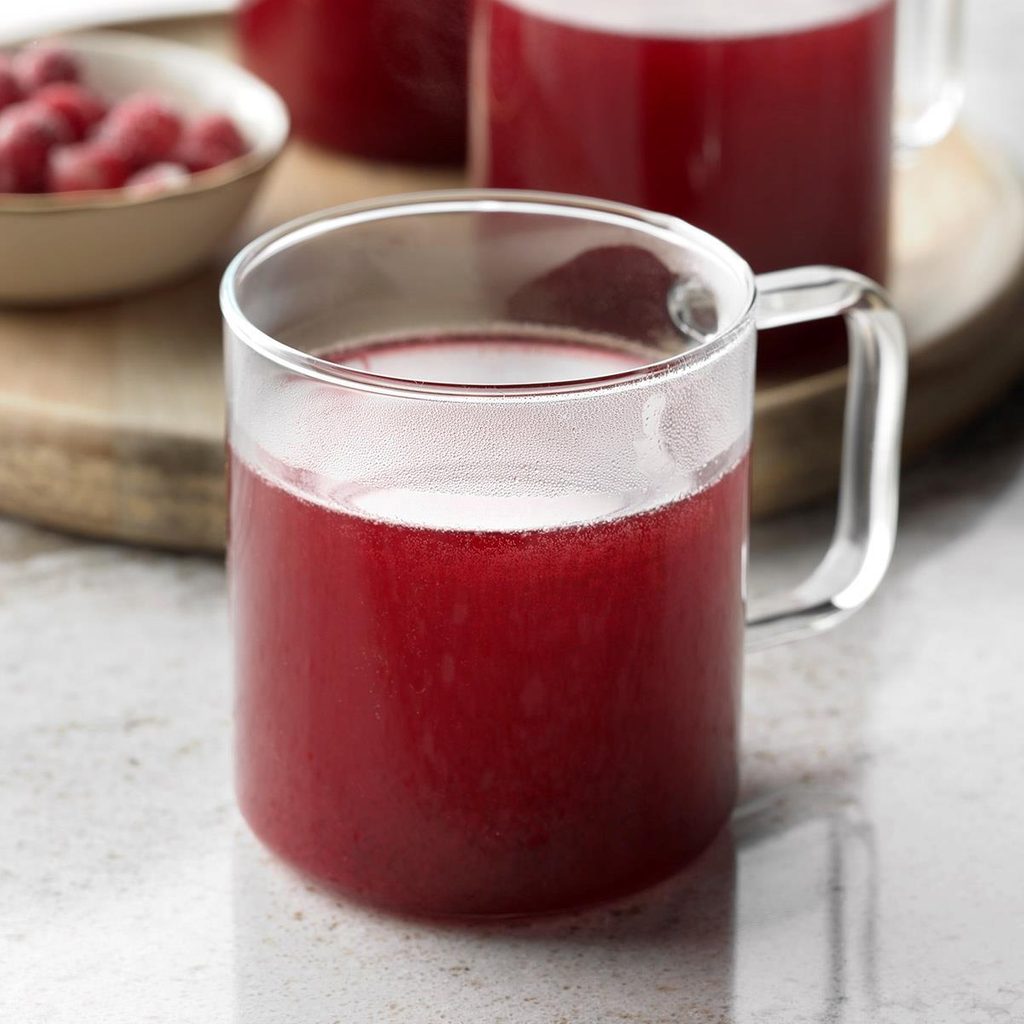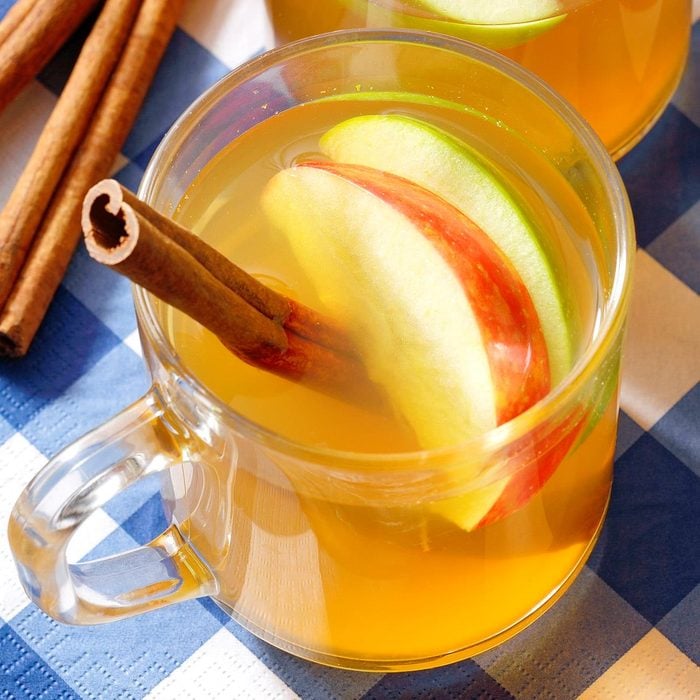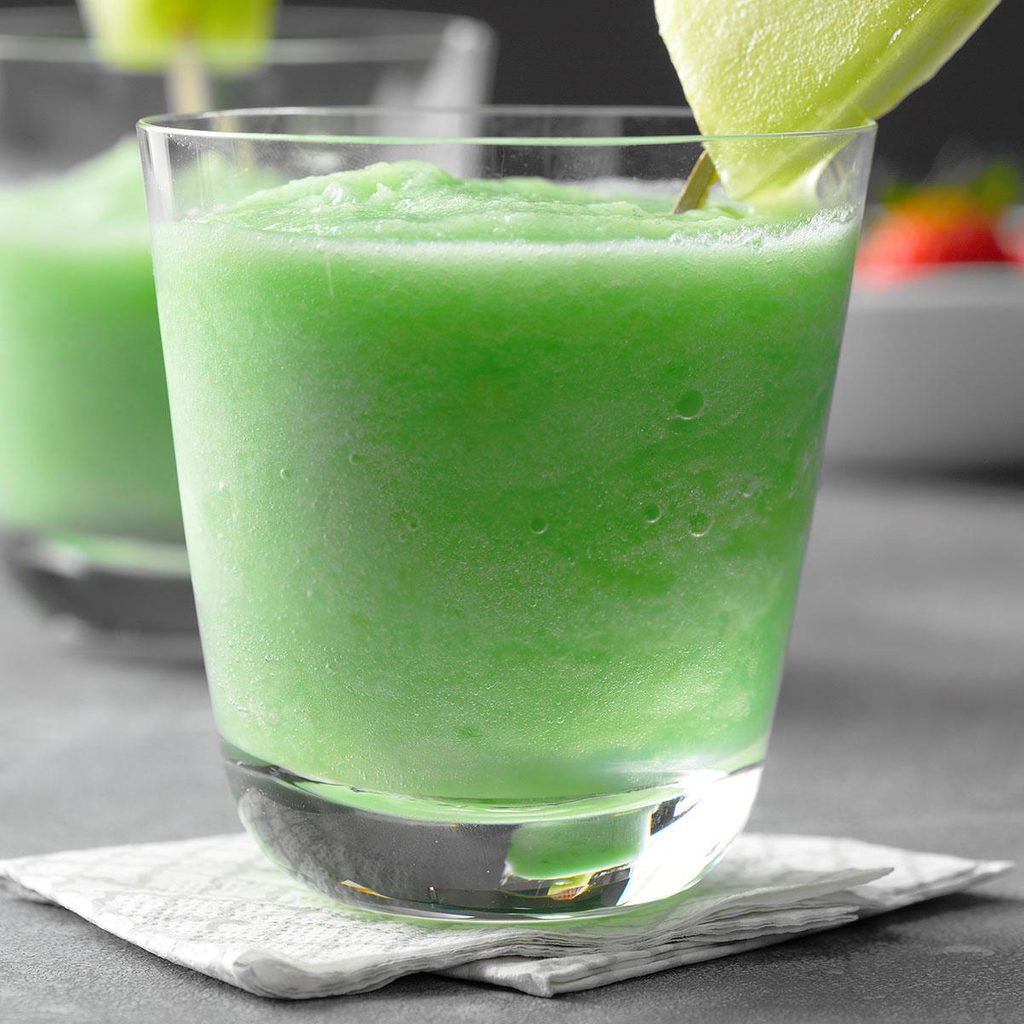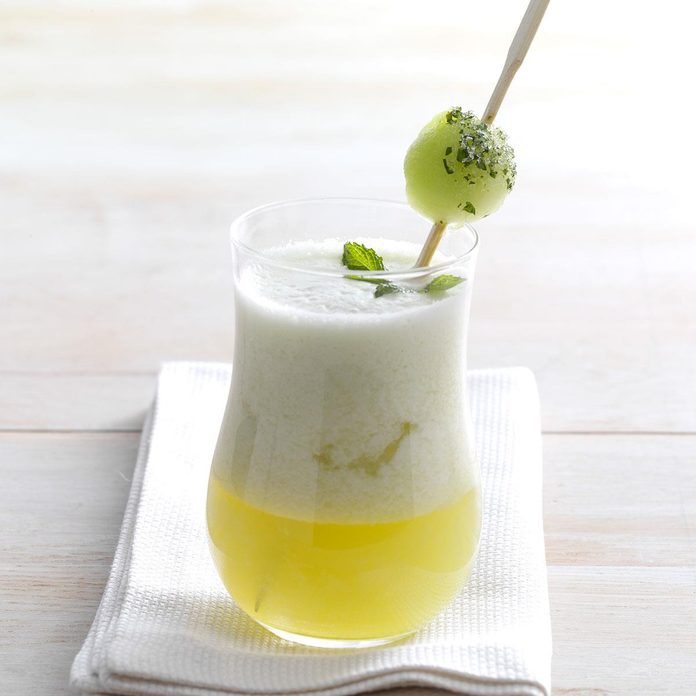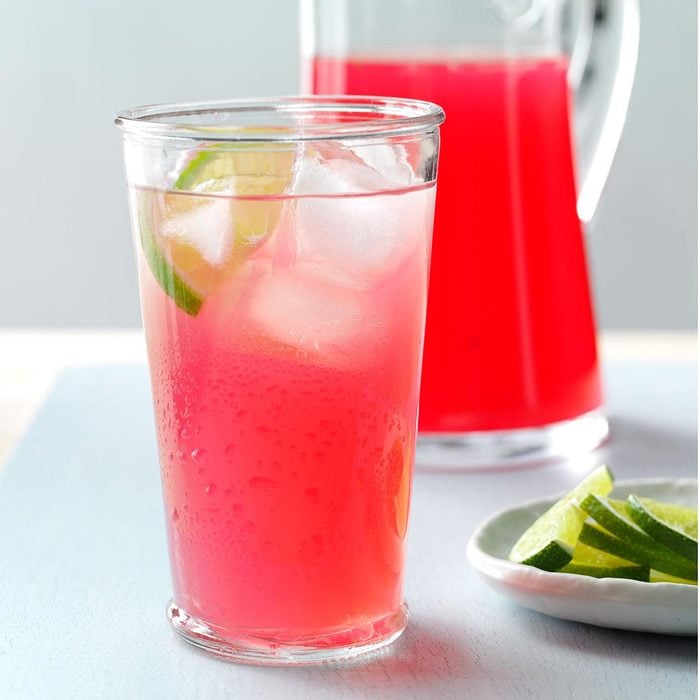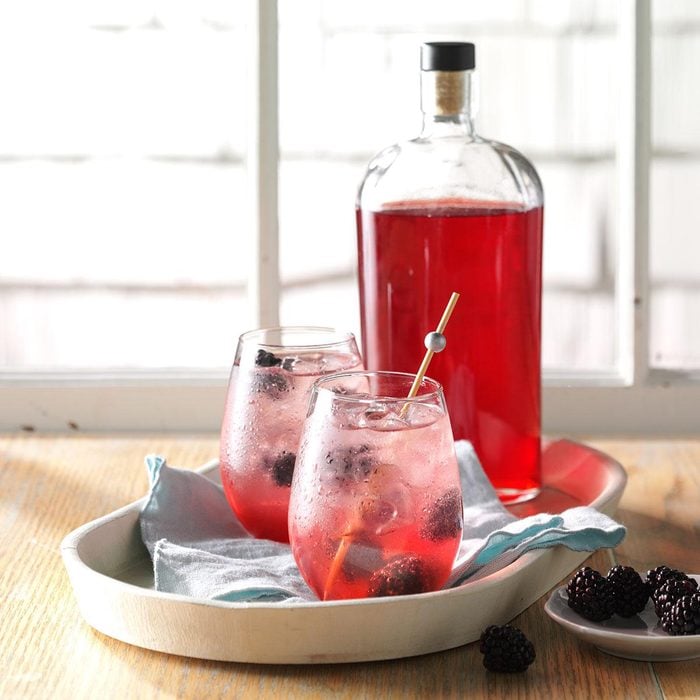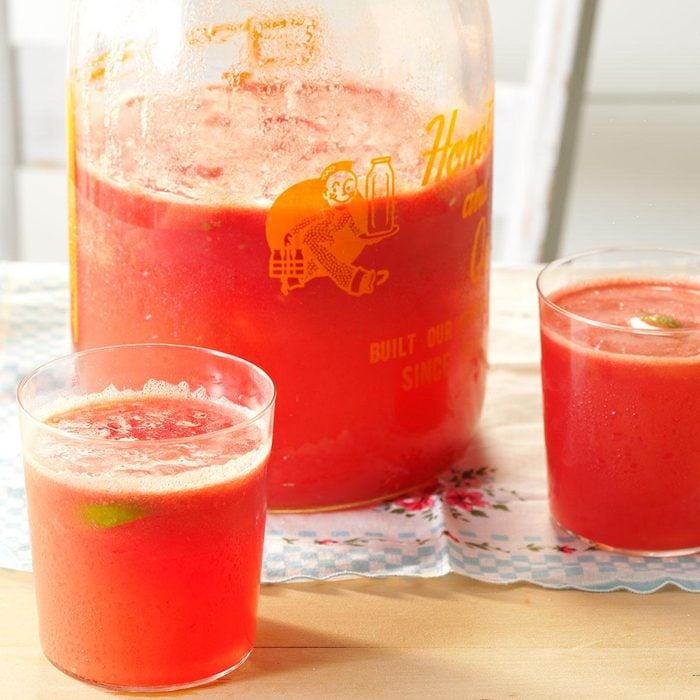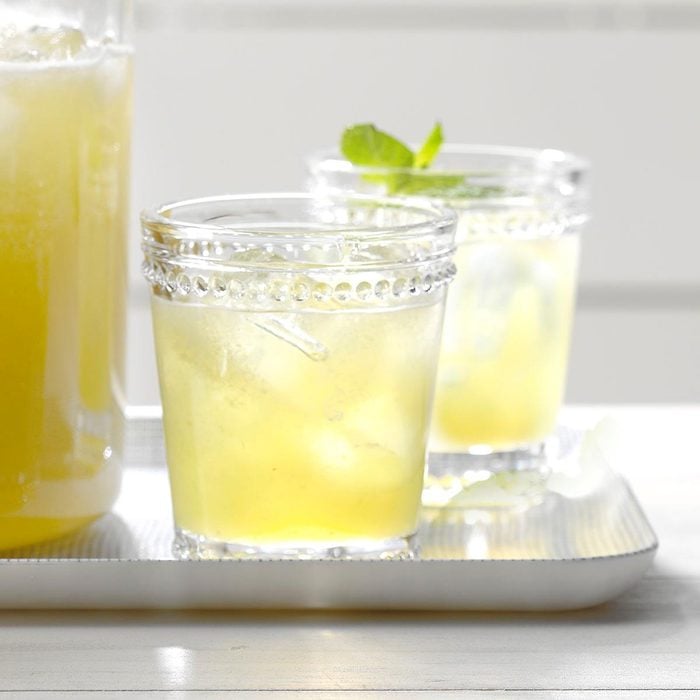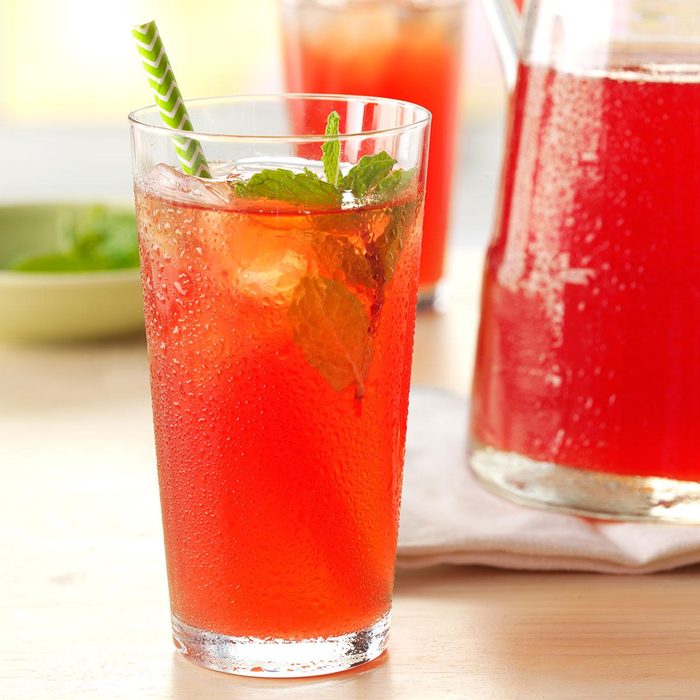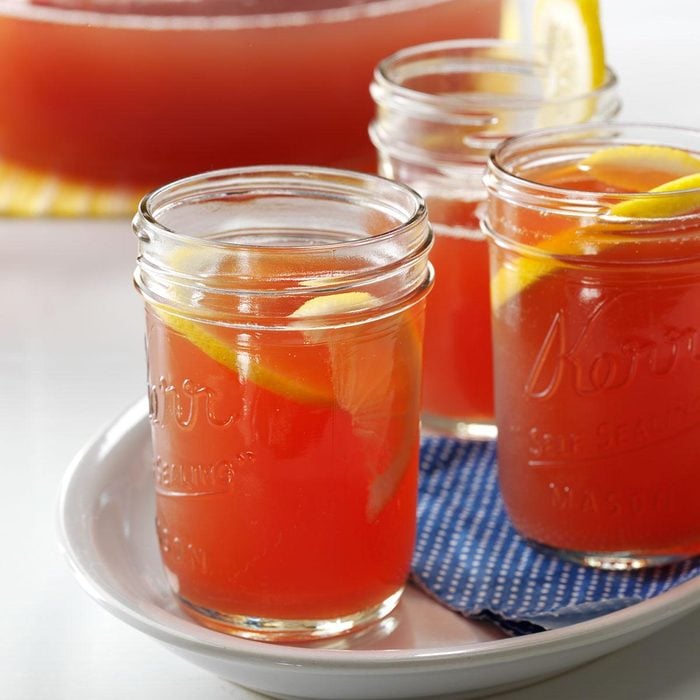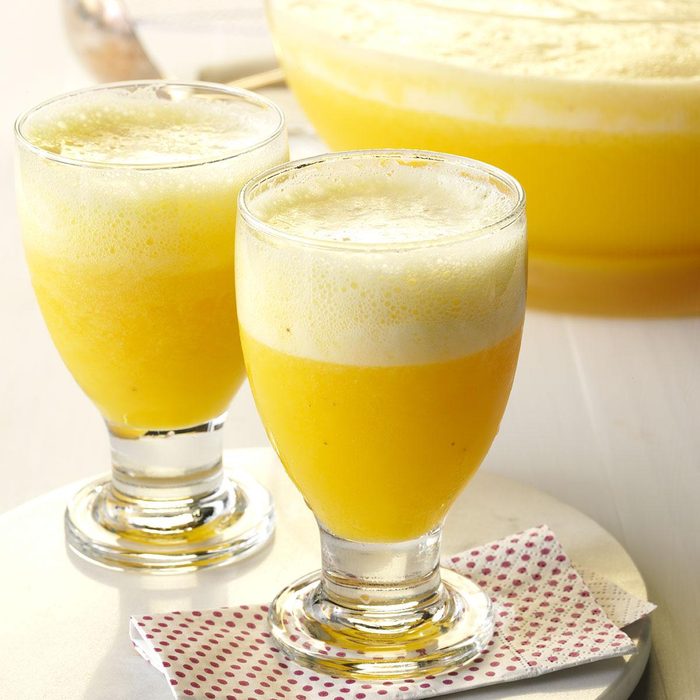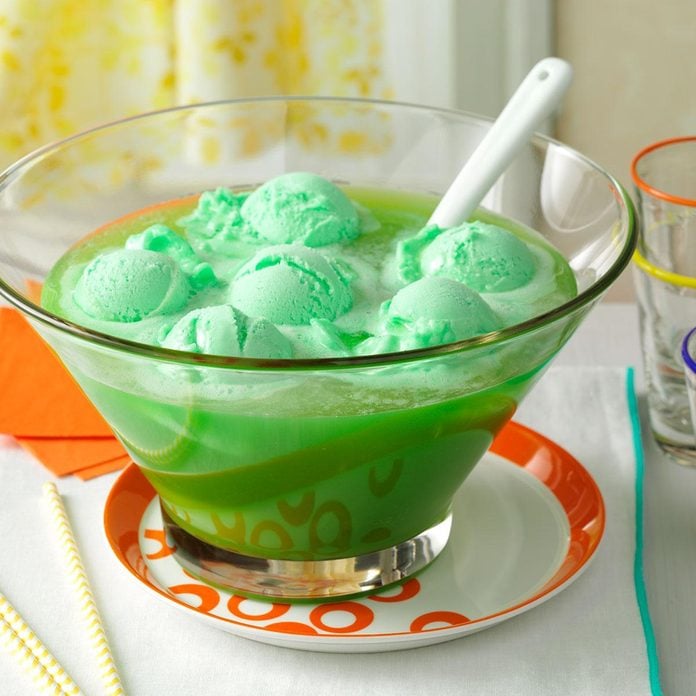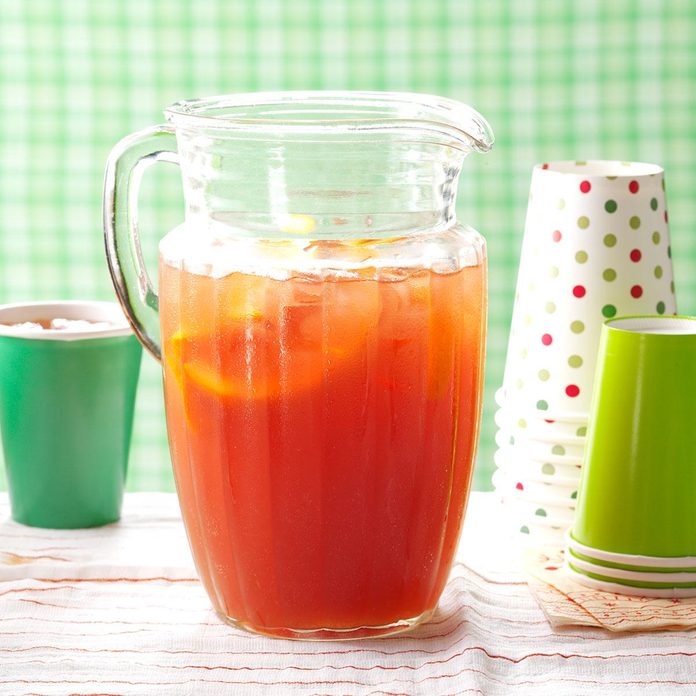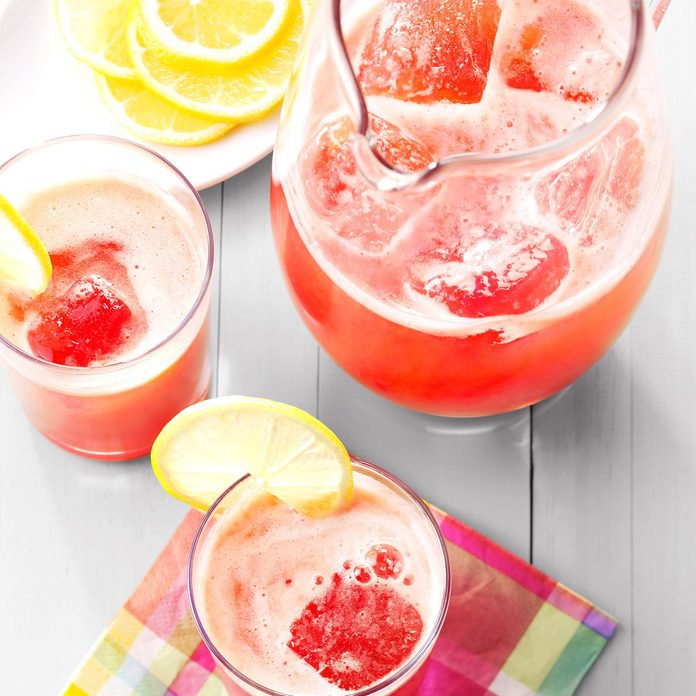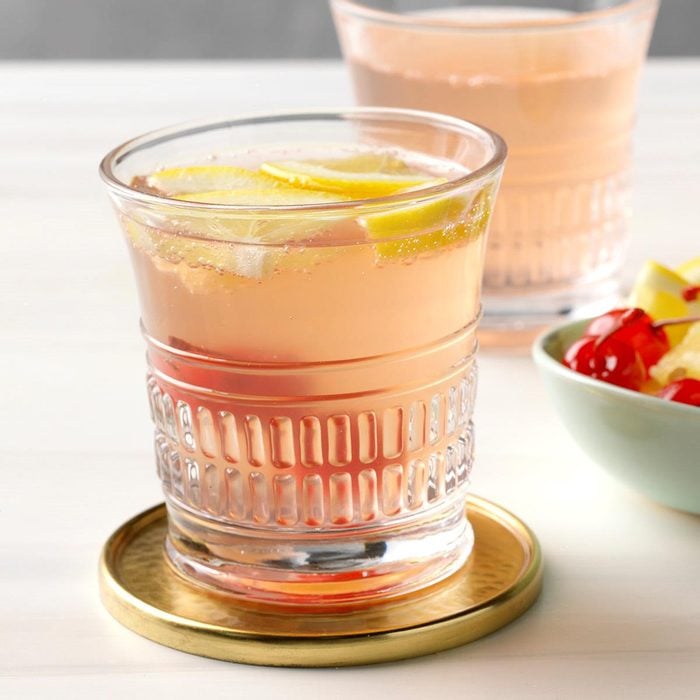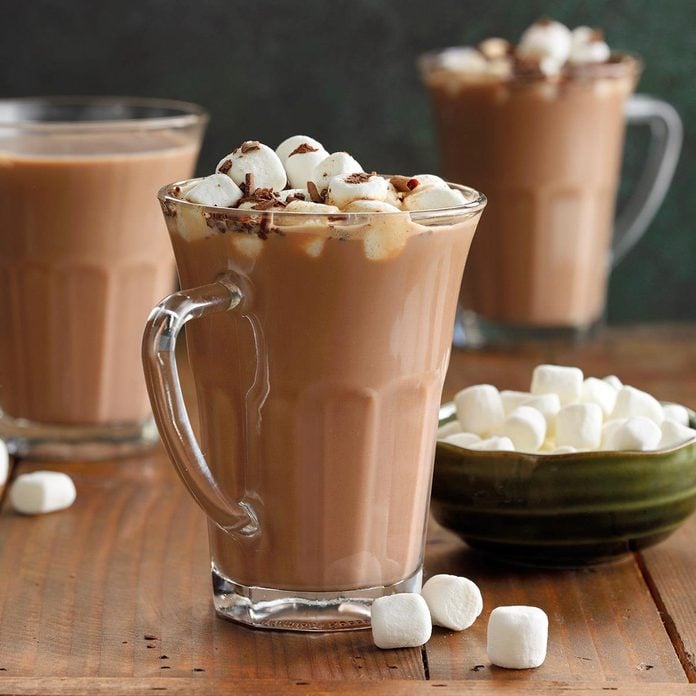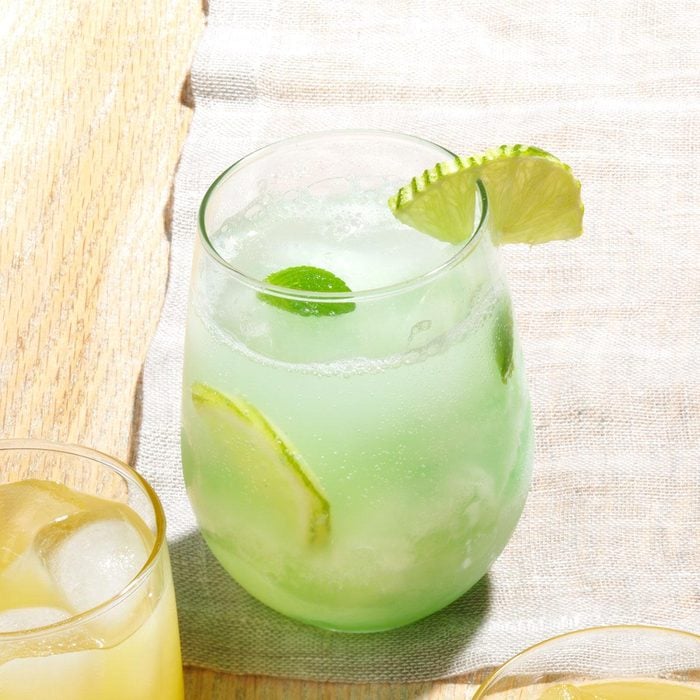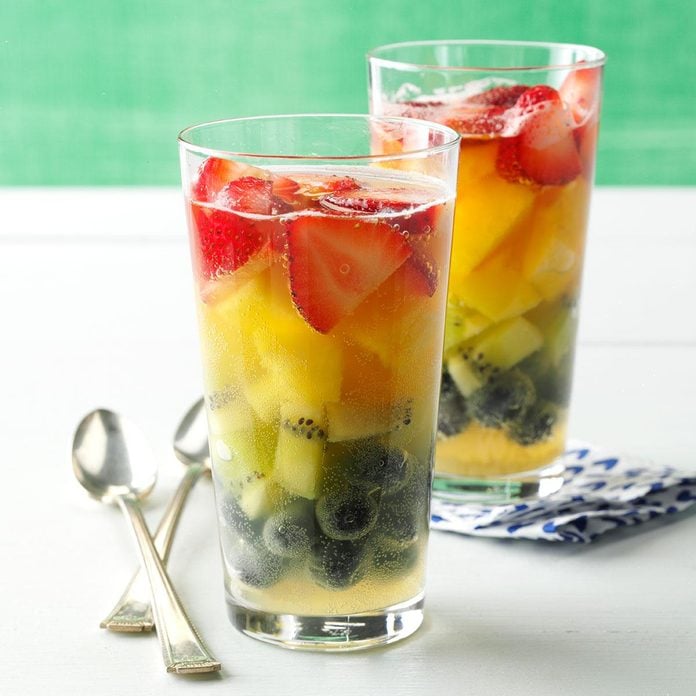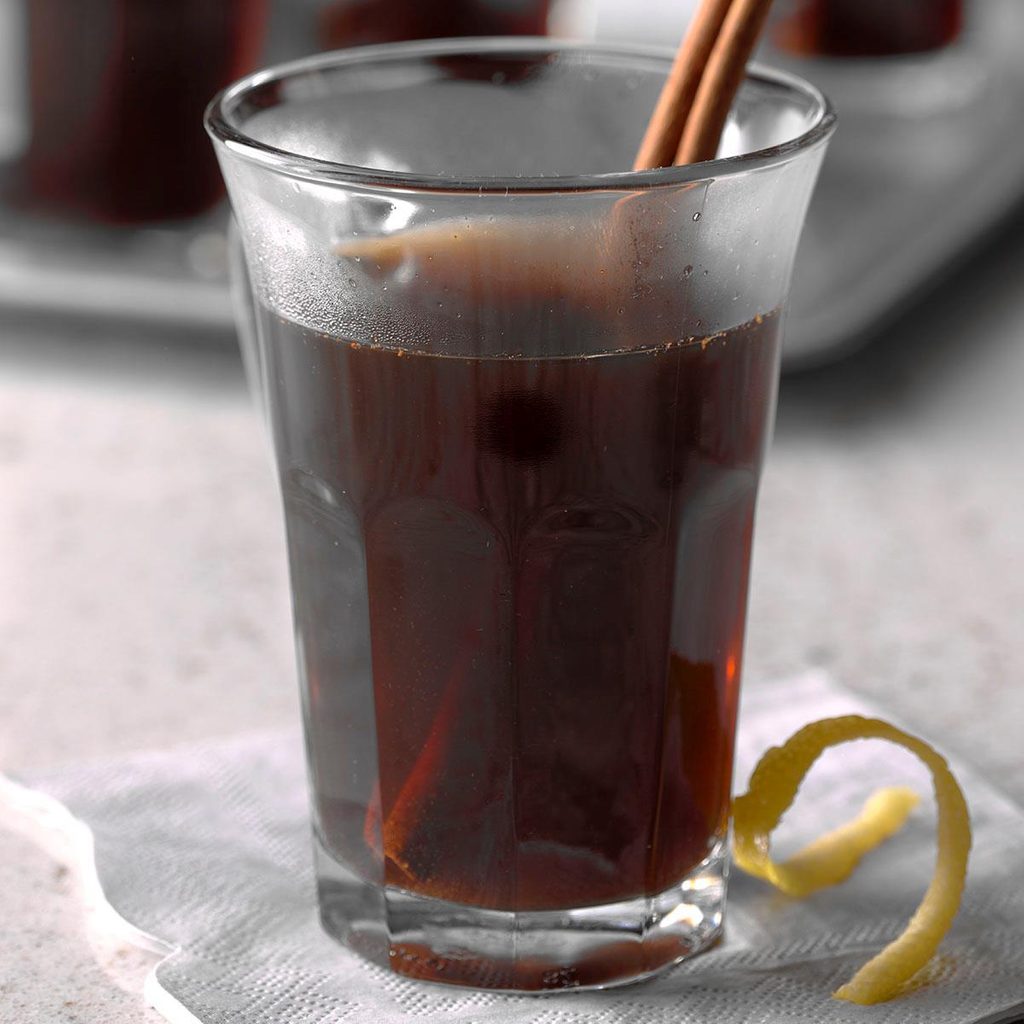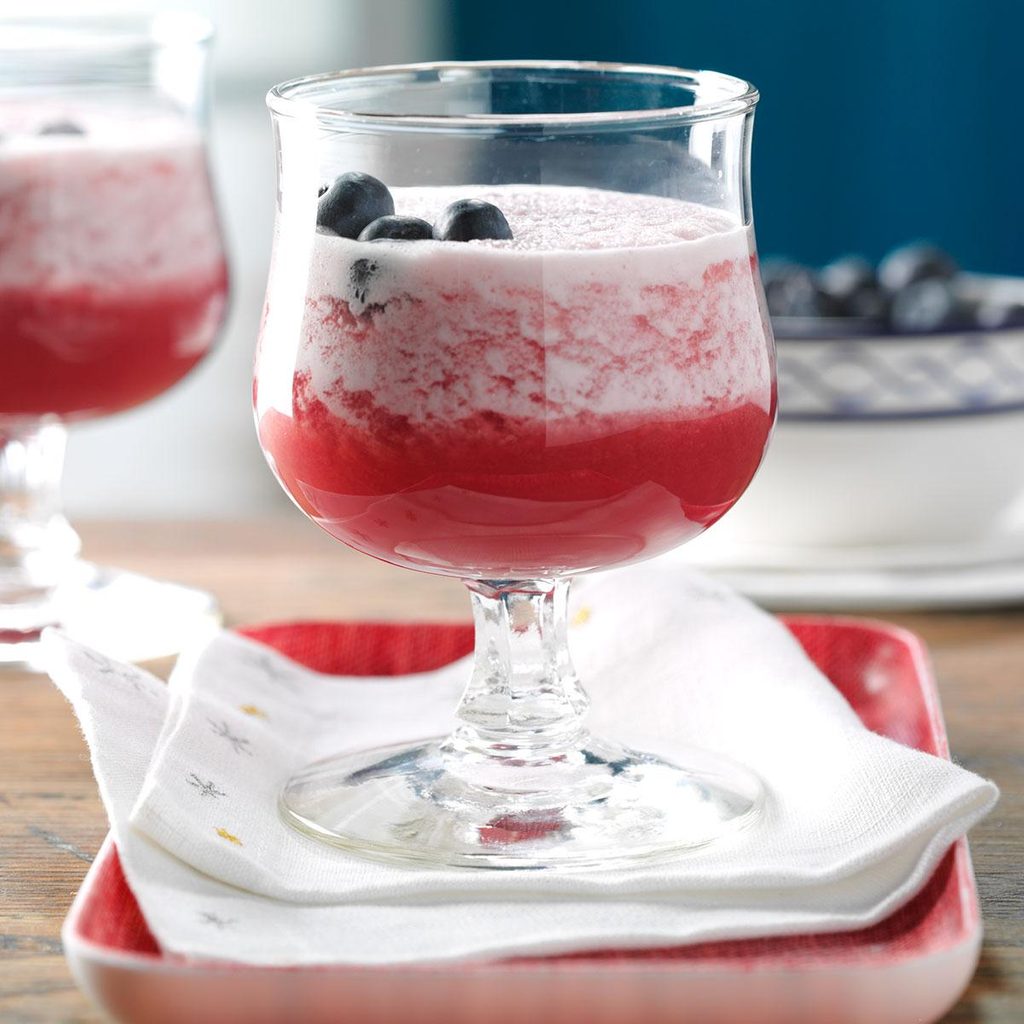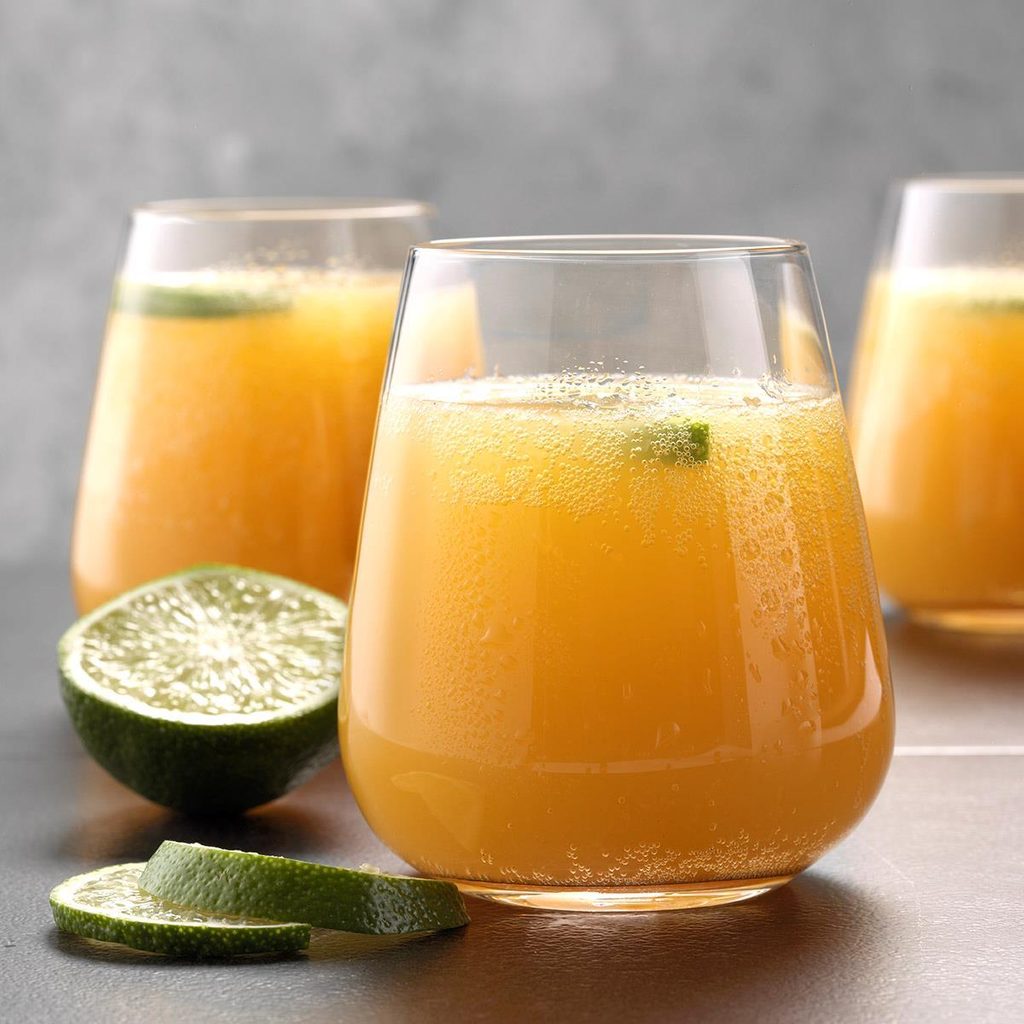Aunt Frances’ Lemonade
My sister and I spent a week each summer with our Aunt Frances, who always had this thirst-quenching lemonade in a stoneware crock in her refrigerator. It makes a refreshing nonalcoholic party drink after a hot day of running around. —Debbie Reinhart, New Cumberland, Pennsylvania. Looking for more options? Check out our favorite
nonalcoholic sunrise cocktail recipe.
Go to Recipe
Blood Orange PunchThis tangy nonalcoholic punch is festive, refreshing and easy to prepare. Instead of plain ice cubes, I add frozen orange juice cubes. —Sandy McKenzie, Braham, Minnesota
Citrus & White Grape Juice Party PunchI was looking for a nonalcoholic party drink that wouldn't stain expensive dresses and tuxedos. Everyone loved this white grape juice and lemonade punch! You can mix the first four ingredients ahead of time, refrigerate and add the soda right before serving. —Karen Ballance, Wolf Lake, Illinois
Easy Citrus SlushOur church’s hostess committee has relied on this refreshing nonalcoholic party drink for bridal and baby showers and other events. We often use different flavored gelatins to match the decor of the occasion. —Joy Bruce, Welch, Oklahoma
Pomegranate Ginger SpritzerConveniently, a pitcher of this nonalcoholic party drink can be made hours before holiday guests arrive. Add the club soda just before serving. —Taste of Home Test Kitchen
Citrus Cider PunchI share this nonalcoholic party drink recipe with people who visit our apple cider mill. It's perfect for autumn and holiday gatherings. —Carolyn Beck, St Johns, Michigan
Cranberry FizzWith just five basic ingredients, this wonderfully tangy nonalcoholic beverage couldn't be much simpler to stir together. —Suzette Jury, Keene, California
Harvest Apple CiderI simmer this comforting cider in my slow cooker every fall. —Lesley Geisel, Severna Park, Maryland
Nectarine, Basil and Clementine Infused WaterNectarine and basil may sound a little strange, but trust us, this combination is a real winner. A few slices of clementine seal the deal. —Taste of Home Test Kitchen
Pineapple Iced TeaWe have a large family, so we go through beverages quickly at our house. This thirst-quenching tea is simple to mix together and has a sparkling citrus flavor we all enjoy. —K. Kitell, Lenexa, Kansas
Spiced Apple TeaI love to try new recipes for my husband and our friends. This spiced apple tea is one of our favorites. I like to serve it warm or refrigerate and serve it cold, too. —Sharon Delaney-Chronis, South Milwaukee, Wisconsin
Scarlet SipperThis sweet, tart and slightly nonalcoholic party drink is a favorite for gatherings at our church. The bright color sets a festive tone, and the flavors blend seamlessly. —Amber Goolsby, Geneva, Alabama
Strawberry-Lavender Infused WaterA little bit of lavender goes a long way, so be sure not to overdo it! This pretty combo screams summer, but you can also dry out the lavender and enjoy this anytime.
Sparkling Coconut Grape JuiceThis sparkling drink is a nice change of pace from lemonade and party punch. The lime, coconut and grape combination is so refreshing. —Shelly Bevington, Hermiston, Oregon
Mulled Grape CiderI came up with this nonalcoholic drink recipe one year when I tried to make grape jelly and ended up with 30 jars of delicious grape syrup instead. I simmered the syrup with spices to make a lovely autumn drink. —Sharon Harmon, Orange, Massachusetts
Cherry Limeade Sweet TeaSweet tea and cherry limeade are two of my favorite summer libations. So I decided to combine them—the result is wonderful. —Renee Page, Rochelle, Illinois
Tropical CoolerWith only four simple ingredients, this nonalcoholic party drink is easy to stir up in just 10 minutes. I served it at a celebration for my son, and everyone liked the slightly tart flavor. —Robin Werner, Brush Prairie, Washington
Tajin LimeadeTajin is a blend of chili peppers, salt and lime. I sprinkle it on a lot of food, but I've found it's really delicious in limeade. —Amanda Phillips, Portland, Oregon
Apricot-Apple CiderDried apricots give this comforting cider a marvelous twist. Add cranberries, cinnamon, allspice and cloves for the perfect hot drink to sip on cool nights. —Ginnie Busam, Pewee Valley, Kentucky
Sparkling Ginger LemonadeChill out with this delightful ginger lemonade perfect for springtime bridal showers or hot summer days on the deck. It's a quick fix you'll stir up time after time. —Jodi Blubaugh, Eagle Mountain, Utah
Tangerine and Thyme Infused WaterWho doesn't love the bright and juicy flavor of tangerine? The addition of thyme really rounds out this infused water. —
James Schend,
Dairy Freed
Honey-Citrus Iced TeaA frozen orange or lemon slice in the glass looks pretty and helps keep this nonalcoholic party drink nice and cold. Using honey instead of sugar adds a sweet touch. —Sheila Bradshaw, Columbus, Ohio
Old-Fashioned LemonadeA sweet-tart lemonade is a traditional part of my Memorial Day and Fourth of July menus. Folks can't get enough of the fresh-squeezed flavor in this recipe. —Tammi Simpson, Greensburg, Kentucky
Hot CiderI dress up nonalcoholic apple cider using lemonade, orange juice, honey and spices for a new version of a classic fall beverage. —Glenna Tooman, Boise, Idaho
Lemon Spiced TeaCinnamon and honey really perk up the flavor of basic lemon tea. Add a splash of
lemon extract to take this nonalcoholic drink delightfully over the top. —Adeline Russell, Hartford, Wisconsin
Pink Party PunchThis easy nonalcoholic party drink will be the highlight of any get-together. The fruity flavors blend perfectly together, making it impossible to have just one glass.—Carol Garnett, Bellevue, Washington
Honey-Pear Iced TeaTake summery iced tea into fall and winter by stirring in pear nectar and adding a fresh pear slice to each glass as a garnish. A little honey provides an extra touch of sweetness.
Ocean PunchThis ocean water punch is refreshing and not overly sweet. Use your favorite Kool-Aid mix to switch up the flavor for every season and occasion. —Elizabeth LeBlanc, Bourg, Louisiana
Orange Blossom Mint RefresherI came up with this recipe because I'm not a fan of regular iced tea. This version has the perfect combination of freshness and sweetness, and the orange blossom water gives the tea a distinctive flavor. People always request the recipe. —Juliana Gauss, Centennial, Colorado
Watermelon SpritzerIt couldn’t get much easier than this bright spritzer! Watermelon blended with limeade is cool and refreshing. It’s a wonderful thirst-quencher on a hot summer day. —Geraldine Saucier, Albuquerque, New Mexico
Lemony Pineapple Iced TeaI like to garnish this iced tea with some of our sweet Hawaiian pineapple. —Beverly Toomey, Honolulu, Hawaii
Cranberry, Orange and Cardamom Infused WaterThis gorgeous infused water would make a great addition to your holiday dinner table. —James Schend,
Taste of Home Deputy Editor
Leprechaun Lime PunchThis delightful St. Patrick's day punch will add a festive touch to your brunch buffet. Enjoy the lively taste of lime sherbet and other citrus flavors in this leprechaun inspired drink. — Gloria Warczak, Cedarburg, Wisconsin
Spiced Cider PunchI’ve shared this nonalcoholic party drink recipe with many friends. It never wears out its welcome and is so easy to make. It’s also delicious warm. —Charles Piatt, Little Rock, Akansas
Cranberry-Apple SpritzerThis is an easy five-ingredient drink to make for your guests for the holidays. Serve it hot or cold. —Courtney Stultz, Weir, Kansas
Peach-Basil CoolerMix peaches and basil with club soda for a cool and refreshing mocktail! —Dana Hinck, Pensacola, Florida
Warm Christmas PunchRed Hot candies add rich color and spiciness to this festive nonalcoholic party drink, and the cranberry juice gives it a little tang. Our children always request it for December brunches. —Julie Sterchi, Campbellsville, Kentucky
Mulled CiderThis is a classic warmer-upper that you can serve on chilly winter days. Pass the brandy separately for those who want it.
Honeydew Lime CoolerServe up a frosty glass of this citrusy blend of lime sherbet and honeydew melon for a real thirst-quencher. I like to sip this on warm afternoons, but it's equally good for breakfast or brunch. —Mitzi Sentiff, Annapolis, Maryland
Lemony Fruit CoolerThis nonalcoholic party drink looks so pretty with all the colorful fruit floating in the bowl. It has a refreshing taste and is easy to put together. —Dawn Shackelford, Fort Worth, Texas
Lemon-Basil Mojito MocktailsIn this twist on the classic summer beverage, lemon and basil take the place of mint. For a grown-up version, just add your favorite rum or vodka. —Cheryl Perry, Hertford, North Carolina
Slow-Cooker Apple CiderThere's no last-minute rush before the party when you simmer this slow-cooker apple cider. It has all the tantalizing flavors of fall. —Alpha Wilson, Roswell, New Mexico
Iced Melon Moroccan Mint TeaI grow mint on my balcony, and this nonalcoholic beverage is a wonderful way to use it. It combines two of my favorite drinks—Moroccan Mint Tea and Honeydew Agua Fresca. For extra flair, add some ginger ale. —Sarah Batt Throne, El Cerrito, California
Cranberry LimeadeWhen cranberry and lime juice get together, the result is thirst-quenching. Add ice and you’ve got a party in a glass. —Michael Passow, Poughkeepsie, New York
Blackberry ShrubMaking a shrub recipe is a creative way to use up extra fruit all the way through Labor Day. We were inspired by sampling the house-made shrubs at a restaurant in California. They are as colorful and refreshing as summer drinks should be. —Gina Nistico, Denver, Colorado
Rosemary LemonadeA friend suggested I add a sprig of rosemary to lemonade. The herb makes the drink taste fresh and light, and it's a pretty garnish. —Dixie Graham, Rancho Cucamonga, California
Watermelon-Lime CoolerWhen temps heat up, chill some glasses and cool down with a slushy blend of watermelon, lime and ginger ale. Slurp and repeat. —Taste of Home Test Kitchen
Iced Honeydew Mint TeaI grow mint in the garden on my balcony. For this tea, I blend two of my favorite beverages—Moroccan mint tea and honeydew agua fresca. —Sarah Batt Throne, El Cerrito, California
Rhubarb Mint TeaA bumper crop of rhubarb and mint from my garden inspired me to create this thirst-quenching pick-me-up. Raspberries deepen the tea's vibrant red color, making the drinks a pretty addition to your table. —Laurie Bock, Lynden, Washington
Pretty Pink PunchThis nonalcoholic punch is convenient because you can make it ahead of time and just add the ginger ale just before serving. —Taste of Home Test Kitchen
Spiced Apricot CiderYou'll need just a few ingredients to simmer together this hot spiced beverage. Each delicious mugful is rich with apricot flavor.—Connie Cummings, Gloucester, New Jersey
Banana Brunch PunchA cold glass of nonalcoholic punch really brightens a brunch. It's nice to serve a crisp beverage like this that's more spectacular than plain juice. With bananas, orange juice and lemonade, it can add tropical flair to a winter day. —Mary Anne McWhirter, Pearland, Texas
Orange LemonadeThis juice is a favorite at our place. I'll often double the batch and send a jar next door to my mother-in-law! I was looking for a way to sweeten lemonade without using more sugar when I came up with the recipe. —Wendy Masters, Grand Valley, Ontario
Lemon-Lime PunchThis frothy refresher topped with lime sherbet is a longtime family favorite and the best punch I’ve ever had. It’s fast, festive and easy to mix up for a variety of occasions. —Mary Ray, Raccoon, Kentucky
Sparkling Cranberry KissI love the tartness of cranberries in cold beverages, and this recipe is easily doubled, tripled or even quadrupled. —Shannon Arthur, Wheelersburg, Ohio
Pink Rhubarb PunchRhubarb is the featured ingredient in this blush-colored punch. A friend passed the nonalcoholic recipe on to me, and we enjoy it so much that I thought others might, too. —Rebecca Mininger, Jeromesville, Ohio
Raspberry Lemonade ConcentrateHere's a concentrate that allows you to enjoy a nonalcoholic summer beverage any time of year. Sweet raspberries balance the tartness from lemons. —Taste of Home Test Kitchen, Milwaukee, Wisconsin
Sparkling PunchAs a table brightener, fix a bowl of festive nonalcoholic punch—it's a refreshing beverage you can mix together in moments. To dress it up even more, I add an ice ring filled with oranges, lemons and cranberries. —Karen Ann Bland, Gove, Kansas
All-Occasion PunchTo keep the punch cold while adding extra color, I like to make an ice ring out of cherry soda pop. The flavor always brings folks back for more. —Carol Van Sickle, Versailles, Kentucky
Hot Spiced Lemon DrinkI received this nonalcoholic beverage recipe from a lady in our church who is an excellent cook. She has shared several slow-cooker recipes with us. We really enjoy the sweet-tangy flavor of this warm citrus punch. —Mandy Wright, Springville, Utah
Vanilla Citrus CiderMy mom used to make cider for the holidays, so I based my citrus-vanilla variation on her recipe. I think it hits the spot! The longer the cider simmers, the stronger the flavors will be.—Kristin Weglarz, Bremerton, Washington
Ginger-Grapefruit FizzSometimes it's hard to find a special, nonalcoholic beverage for parties that isn't a punch. That's why I love this grown-up bubbly drink that offers a little tartness from the grapefruit and spice from the ginger. —Dawn Viola, Clermont, Florida
Hot Cocoa for a CrowdThis is a simple, delicious and comforting hot cocoa with a hint of cinnamon. It has just the right amount of sweetness.—Deborah Canaday, Manhattan, Kansas
Mojito SlushWhether you're splashing poolside or watching the kids inside, this slushy beverage has just the right balance of minty crispness and limey tartness that's sure to tingle your taste buds. —Jessica Ring, Chicago, Illinois
Rainbow SpritzerLayers of colorful fruit submerged in a fizzy, sweet beverage make this a kid-friendly sipper that gets two thumbs-up. —Taste of Home Test Kitchen
Pumpkin JuiceOur family loves Harry Potter. Inspired by the popular series, I decided to come up with a beverage—pumpkin juice! My kids think it’s surprisingly delicious. I love that it’s healthy, easy to make and a refreshing addition to any fall meal. —Geraldine Saucier, Albuquerque, New Mexico
Sparkling White Grape PunchWhite cranberry juice adds tartness to this punch for showers and teas. For a light blush tone, use regular cranberry juice. —Julie Sterchi, Jackson, Missouri
Mulled Dr PepperWhen neighbors or friends visit us on a chilly evening, I'll serve this warm Dr Pepper with it's spicy undertones along side ham sandwiches and deviled eggs. —Bernice Morris, Marshfield, Missouri
Blueberry Lime SlushMy husband's family makes a cranberry beverage for the holidays. I changed it up and serve it this way in winter and summer, when blueberries are in season. —Rebecca Bratsman, Tacoma, Washington
Celebration PunchThis pretty fruit punch has just the right amount of sweetness. The ice ring keeps it cool for hours without diluting the flavor.
—Marci Carl, Northern Cambria, Pennsylvania
Mango Orange QuencherServe this beautiful beverage at your next brunch in place of mimosas. Just chill the base an hour before adding the club soda. —Taste of Home Test Kitchen
Smooth Sweet TeaA pinch of baking soda eliminates bitterness in this smooth and easy-to-sip tea and it has just the right amount of sugar so it's not overly sweet. —kelseylouise, Taste of Home Community Member
Punch DelightWhen we celebrated my mother's 75th birthday, we wanted a punch everyone could enjoy. This delightful combination of lemonades, juice and soda was perfect and so easy to make. All our guests loved this yellow punch recipe. —Barbara Koehnke, Fremont, Wisconsin
